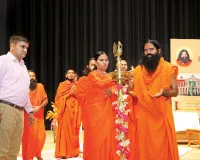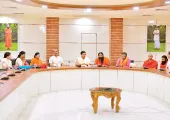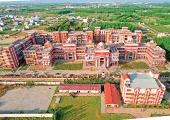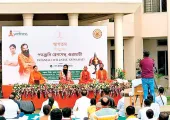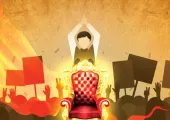Nehruji made China neighbour of India
On

Prof Kusumlata Kedia
Nehru Cabinet held meeting over the incident being happened in Tibet. In the meeting, Narhari Vitthal Gadgil criticized Nehruji politely. Nehruji chided him and said, ‘Do you not know that the Himalaya is situated there? Gadgil replied to it, China has been attacking Tibet by crossing it on many occasions. But Nehruji pacified him. Expressing reservation over Mao army attacking Tibet, Sardar Patel too wrote a letter to Nehruji gave no reply to it. This has been mentioned by Kanhaiyalal Maniklal Munshi in the page 175-181 of part I of his book ‘Pilgrimage To Freedom’.
Sardar Patel had written that—‘We along with Russia help Mao Government get membership at the UNO. Despite, China has been leveling false allegation. It reveals that they are not friend of mine but possible enemy’. He wrote a letter by preparing a list mentioning necessary subjects and ways. Nehruji gave no reply to this letter too. Nehruji wrote a detailed letter to officials of External Affairs Ministry. According to which, ‘we had written a letter to Chinese Government on November 1, 1950 that our control will remain the same on Lhasa over Indian Political Agent and trade agencies and Indian Postal and Telegram Officers and military police and trade route in Gyantase and Yatung. Replying to it on November 16, 1950, Mao Government alleged us that it is setting up its sovereign in Tibet and India has no right to create obstacle in it. India has already accepted our sovereignty, it said. Therefore, Nehruji deliberately used to write such letter which was used by Mao in his favour.

In this letter, Nehru told External Affairs Ministry officials that ‘we have to keep attention that China is going to become our neighbour and it’s unlikely for Communist government to get demolish. Therefore, we should devise long term approach. China will take over entire Tibet which has no capacity to counter them. Neither we nor other countries have capacity to stop them. Despite, he continued to raise the issue of Tibet’s autonomy because their geographical and climatic condition make them autonomous. This was the language full of complexities. Later on many occasions, Nehru said that it would be beneficial for Tibet in future, therefore we should accept Chinese victory. We can’t provide shelter to Tibet, if we try to protect them, they will fall in great difficulty. It will be injudicious to them.
A proposal was going to be presented in the UNO against Chinese attack on Tibet for which a draft of appeal was prepared. The entire world believed that India will support this move wholeheartedly. But Nehru said that we didn’t support this appeal. We should not take such step. We will try that there should be no discussion on this appeal in the UNO. America and other powerful nations are taking interest to create obstacle for Mao government. Therefore, we have to try hard that no discussions would be held in UNO. (Nehru’s special work part 15, bookbinding 2, page 342-352). At last, Nehru put obstacle in passing of appeal in the UNO.
When the Parliament started to discuss this subject on December 6, 1950, then Nehru said in the Lok Sabha that ‘we want peace in the world instead of war’. China (Mao) is already suspicious and working injudiciously. Therefore, we should try to maintain peace. We have no political ambition about Tibet. Mao is talking about giving freedom to Tibet. But it’s vague that from whom he wants to provide freedom to Tibet which is not in a position to wage war. Therefore, there will be no war between Tibet and China. It’s entirely illogical statements passed by Nehru over Chinese attack on Tibet. When Shayama Prasad Mukherji, Narhari Ranga and other people expressed unhappiness over Nehru’s statement then he delivered a long speech and said that power of history and process of history get affected by infinite factors. Tibet is undergoing phase of transformation. Whatever steps we are taking, are good for them. The great country like China (He tried to term Mao as the great ruler, nationalists were against the China) won’t listen to my advice. Therefore, it would be judicious for us to accept Chinese sovereignty over Tibet. (Lok Sabha discussion on December 7, 1950).
Mao army butchered thousands of Tibetans and bulldozed many of them. These were published in the newspapers. Nehru held press conference over the issue in Delhi and said that the Chinese army infiltrated in East Tibet. One Chinese army entered into India side by mistake. It’s being published in newspapers as Chinese army’s entry into Indian border. This is wrong. Very few of Chinese army are present there in Tibet. (Nehru’s special work part 16, bookbinding 1, page 443--444).
On June 11, 1951, he again held press conference and said that Dalai Lama fled from Lhasa and entered into our border and we advised him to request to China for his autonomy. And he returned there. Tibet is unable to face Chinese army who will supress more due to our unrequired opposition. Therefore, we are going to become spectator.
After 5 months on November 2, 1951, he held next press conference where he said that China is considering a big part of India as their own part. But that map is very old. Therefore, we should not be suspicious about it. (Nehru special work part 17. Page 507).
Nehru dispatched Pannikar to Western Europe and America to convince them to provide China membership at the UNO. Because, nationalist China had membership of UNO. But Nehru was denying their existence. It is nothing but to deny very existence of China. Rejecting an existed nation openly is possible only for a communist. Nehru’s steps prove that he had no respect in the world peace and the Panchsheel.
Mao and Chau N Lai had great affection for Nehru that they started to request him for rice and other edible items for their army indulging in butchering Tibetans. Nehru accepted this offer and dispatched rice so that Mao army can slaughter Tibetans. Moreover, he also arranged fuels for Chinese army’s vehicle.
On April 5, 1952, Chau N Lie asked Indian Ambassador that he will have to depend on India for grain supply for his army. We want that India should help him in this regard.
Pannikar apprised Nehru of this development and said that we should stop the supply. Nehru said that ‘we know that this food grain is supplied for Chinese army stationed at Tibet. It’s the need of hour’. In May 1952, Nehruji ordered to dispatch 500 tonne food grains for Chinese troops. He also said that we needed common agreement related to our interest in Tibet. In a press conference on June 21, 1952, a journalist asked him that is India sending rice for Chinese troops? Nehruji replied that –‘not much’. No large quantity of rice can be dispatched to Tibet due to narrow and dense mountainous region. Their troops need food grains. We want to see them out of Tibet and therefore atmosphere of discussion between both the countries is the need of the hour and we should help them survive there in Tibet. (Nehru special work part 18, page 473-477). When the honourable MPs expressed reservation about role of Pannikar in China, then Nehruji replaced him with N Raghwan as ambassador. N Raghwan reported that China has lackadaisical attitude towards us. Nehruji replied that—‘they are our friends’. In another letter, he wrote—‘we will provide one lakh tonne rice received from China for their troops stationed at Tibet. For this, we are making transportation arrangement. We will also think about other items’. Nehruji soon dispatched fuels apart from food grains. (Nehruji special work part, 23, page 354-355 and part 26, page 483). It’s anticipated that he provided ammunitions for Chinese troops in Tibet.
In a press conference on February 28, 1952, Nehruji was asked that have Chinese troops infiltrated into Tibet? He replied—‘ we have information about it’. (Nehruji special work part 17, page 510).
On April 12, 1952, he expressed doubt that Chau N Lai doesn’t want to discuss the problem of our interest. In another letter, he said that – ‘India doesn’t want privilege in Tibet, because such privilege is nothing but result of treaty given by British Imperialism’.
In September, 1952, an Indian delegation sent report from Lhasa that several groups of patriot Tibetans are active against Chinese aggression and one of them is in direct contact with us. They are asking for only Rs 2 lakh. Getting angered on it, Nehruji said that it won’t be viable either practically or morally. We shouldn’t interfere with internal issues of Tibet who should resolve their issue with Chinese counterpart through cordial manner.
It’s worth mentioning that Jawaharlal Nehru, who had already invited delegation of free Tibet nation few days ago, doesn’t deem supplying grains, fuels, etc to Chinese troops butchering people in Tibet as interfere in internal matter. But he considers patriot Tibetans demanding help of Rs 2 lakh to stop slaughtering as internal interference. Dr Ram Manohar Lohia had termed Nehruji’s such work as sedition.
When many people raised this issue that India has been holding authority on Tibet, then Nehruji termed it as the work of imperialist British and said that now imperialism got disintegrated. Meeting of Prime Ministers of commonwealth nations was held in Colombo in July, 1956 when many countries raised issue of nationalist Chinese government. On the issue, Shri Nehru said that representing China by nationalist government in the UNO is useless issue and it’s shame on entire Asia. (Nehru special work part 25, page 423-426).
He sent message to Chau N Lai through Raghwan that we have made it clear Chinese stand in Colombo conference. (Nehru special work, part 28, page 167-168).
After some time, he again asked Raghwan to make it clear to Chau N Lai that we are defending them at every platform and trying that Chinese representation may be given to his government at UNO. Nehru said that he himself held discussion with US Ambassador in this regard and instructed Krishna Menon to do so in London, Ottawa and Washington. In nexus with Nehru, Mao termed him ‘sycophant of British American imperialism and alleged that Nehru is hatching conspiracy to take over Tibet with support of England and America.
News agency reuters published news on rising number of Chinese aircrafts in Tibet. The Indian citizens and leaders decided to observe ‘Tibet Day’ to oppose it in August 1953. In this regard, Jawaharlal Nehru wrote to AICC general secretary that any Congressman would participate neither in Tibet Day nor in committee’.
Next month, Nehruji sent a message to Chau N Lai that ‘it’s matter of satisfaction to increase cooperation in international issues among our countries. Excellency had said that there is no difference in the approach of China and India. Government of India wants to arrive at decisive agreement with reference to pending issues. (Nehru special work, part 23, page 485-486).
Meanwhile, Nehru started to make comment that ‘we don’t support feudalist elements and we can’t interfere in Tibet’. He decided that police post should be erected at borders. A senior army officer said that in fact, the army should provide security to these posts, otherwise it will be demolished in enemy attack. But Nehru was adamant to set up police posts.
Chau N Lai and Mao understood Nehru’s nature and started to hold discussions with Nehru over international issues. Both of them watched film Jhansi Ki Rani at Agra together. In the page number 94 of his book ‘India China Relation’, Shri Arun Shauri said that Chau praised movie Jhansi Ki Rani. Nehru replied immediately that its script is not so good. Then Chau said that it’s the description of anger against foreigners. Nehru replied immediately, ‘it was the anger against feudalist elements. Chau said – ‘anger always starts from higher class’. Nehru remained silent.
Similarly, Shauri opines that Nehru continues to condemn US constitution and administration to please Chau. Later, Nehru advised Chau to become hilarious to avoid the questions being asked in today’s press conference. Chau returned and intensified slaughtering in Tibet.
On June 27, 1954, Nehru wrote to the UNO—‘Chau N Lai is great orator and wiseman. I apprised him of Burma’. Shauri writes that the fact is that Chau asked nothing about Burma. On July 1, 1954, he dispatched 20 pages letter to chief ministers of India and wrote that Chau N Lai’s visit to India is an important historical incident. It’s worth mentioning that it was the time when China was preparing to construct road in Aksai Chin.
He also said that ‘China will set up it sovereign over Tibet. Our condition was the memoire of imperialism Britain in Tibet. It will be judicious for us to maintain privilege received from British expansionist policies. It’s possible for us to oppose Chinese prowess in Tibet. We don’t support feudalist system. China has started to construct roads and airports in Tibet and it’s natural. We continue to get information regarding military movement in Tibet. Although we don’t believe in such information. Tibet is mountainous region and their climate is different from that of China. Therefore, it’s easy for foreigners to settle there in Tibet’. Arun Shauri has published part of this letter written to chief ministers.
Tibetans started to oppose demolition being done by Mao military in Tibet. The people residing at Tibetan borders along India also started to oppose this massacre. The people held discussions over it. Shri Jawaharlal Nehru said that we can’t promote such activities in our region. We will tolerate only peaceful agitation.
India’s Political Counsel in Sikkim BK Kapoor sent a report regarding undesirable movements of Mao-led Communist Party. Getting unhappy over it, Nehru said that Shri Kapoor commenting on China is not soothing to him. He said that— ‘we are considered as ruling class in Tibet and it’s expected that we will put obstacle in Chinese expansionist path. But we can’t do so’.
Earlier, Shri Nehru said that Mao and Chau believe that whatever map, which mentions some part of India under Chinese border, they are publishing, are old and new. The map will have nothing undesirable. But now Chau N Lai said that he doesn’t treat these maps as authentic. Nehru failed to make it clear. He said that – ‘he is worried over continuous publication of this map mentioning our region as Chinese one’.
Meanwhile, Soviet Union also published such type of map upon which Nehru clarified that the Soviet administration is publishing photocopy of Chinese maps.
When it was demanded that our air force be strengthened and number of fighter jets be increased, then Nehru said that – ‘these demands are excessive and pumping money in it will halt our industrial growth to some extent. Doing this will against basic approach of our security policy’.
When the political counsels appointed in Sikkim and Bhutan reported that over 1.25 lakh Chinese army are present there in Tibet, then Nehru said that this number is unbelievable. Menon has told me that there are only 45000 armies in Tibet. (Nehru special work part 28, page 477-478).
After few days, Nehru extoled China in Commonwealth Prime Ministers Conference and as he returned Delhi, Chinese army attacked Burma and snatched their thousands of miles of land. Burmese government requested Nehru to do something for stopping Chinese aggression. Nehru got prepared a memorandum through foreign affairs officials, instructing them not to raise question related to Indian border along China directly. (Nehru special work part 34, page 250-259). Mao declared that he is not bounded to earlier treaties and agreements. Nehru got agitated over it. Moreover, Chau N Lai called Burmese Prime Minister to Beijing for talks. Nehru advised through his ambassador that talks should be held in peaceful and amicable state.
Meanwhile, Mao troops took over some part of Ladakh. The Indian Parliament expressed concern over it. Then Nehru said—‘no grass can grow there’. The newspapers published news quoting Shri Mahavir Tyagi that no leaf of grass can grow on his head (he was bald), then can he offer his head to others. Nehru remained silent.
In September, 1956, Mao troops infiltrated into Indian region by crossing Shipki-La Pass of Himalaya and tried to move upto Shimla. Meanwhile, Nehru termed it as a serious issue and said our police will have to give befitting reply to it. (Nehru special work part 35, page 515—516).
Dalai Lama arrived India and Nehru met him on November 26-28, 1956. Dalai Lama also said that 1.25 lakh Chinese troops are slaughtering Tibetans. Therefore, India should help Tibet in this regard. Nehru replied—‘neither India nor other country is in a position to help Tibet’. (Nehru special work part 35, page 520—522). When Dalai Lama was in Delhi, then Chau N Lai arrived Delhi and Nehru himself reached airport to receive him. After secret talk, Nehru convinced Dalai Lama to return to Tibet. As per the published documents, Chau N Lai himself said that Tibet was never the part of China in the past. Therefore, we will provide autonomous status to Tibet. India has no more information regarding Tibet because both the countries have been related to one another. Reacting to it, Nehru said that he believes that even Tibet has been part of India theoretically but it has been autonomous region practically. Therefore, we provide your authority on Tibet.
Nehru said to Chau that India has religion-based interest in Tibet where sacred pilgrimages like Kailash and Mansarovar are situated there. It’s worth mentioning that Nehru never highlighted that historical facts which were hinted by Chau himself in his talks that you have more information about Tibet. The fact is that our purans write that – ‘ye vasanti kurukshetre, te vasanti trivishtape’. (those who live at Kurukshetra are Indians residing in Tibet). Nehru didn’t mention this fact with Chau that the Tibetans ruled over China for hundreds of years and Tibet rulers validated Hun, Mangol, Turk rulers who have been the religious guru there. Their provinces were validated.
Therefore, Nehru surrendered before Mao and Chau and let the communism spread, their troops take over Tibet and butcher Tibetans. Meanwhile, they continue to visit China and Soviet Union and extol their governments. At last in March, 1959, Dalai Lama had to get deported from Tibet. He arrived here in the dark night and he had to wait for three weeks to meet Jawaharlal Nehru.
In fact, border related tension developed between Soviet Union and Mao. It seems that some leaders hinted Nehru during his Soviet Union sojourn due to which he made arrangement of his stay at Dharmashala in 1959. But at the same time, he also instructed that Indian government must not allow Dalai Lama to hold agitation against Mao government from their land. He will be allowed to present his views peacefully.
On March 30, 1959, parliamentarians asked questions over Tibet in the Parliament. Replying to it, Nehru said that we framed policy by keeping China in mind and withdrew troops from there. It’s also being said that we relinquished our privilege in Tibet. Because they were of during imperialism period. In the Parliament, Nehru accepted that China grabbed three times more land it had in 1949. In that condition, we can do nothing. Four days later on April 3, 1959, Nehru informed the Lok Sabha that Dalai Lama has arrived India.
From May, 1959 to August 1959, many distinguished Parliamentarians like Acharya Kriplani, Atal Bihari Vajpayee, etc expressed their great concern over this issue that Nehru let China grab Tibet. But Nehru continued to prove himself true. On top of that, he continued to criticize Changez Khan and Kublai Khan, etc and praise Mao. At last, he accepted that the Tibetans had to bear atrocities and said that what he can do. Tibet had to get free from feudalism.
Meanwhile, China continued to infiltrate into Indian border upon which the Lok Sabha discussed on May 8, 1959 and Nehru said that East and North part of Ladakh were mountainous region. Their valleys are also over 13000 ft high. Between October 1957 and February 1958, the Chinese troops infiltrated into Indian side upon which we wrote to Mao administration. Later, he set up military camp along Indian border.
Expressing concern over it, they termed their own land. Mao government has constructed a road towards Turkistan. It passes through Ladakh. This region is thousands of miles long. Boundary line is unclear on several places. They shown our parts as their own in the maps. We have expressed concern over it.
Nehru deliberately set up police posts along the border. Mao troops arrested them during their movement. Replying to it in the Parliament, Nehru said that they were freed. When Jaswant Singh asked that is there any doubt over it, then Nehru replied that—‘ yes, they are terming our land as their own and something is still unclear’. Therefore, Nehru showed pseudo war in 1962 and offered a major part to China for letting Mao-led communist party spread. In fact, Nehru was eager to give Kashmir to Mao that time. Mao himself didn’t want to attack India, it continues to prove from talks between Chau and Nehru.
When missile war was about to happen in October, 1962 in Cuba and both Soviet Union and America were in the position of confrontation, pseudo war was waged. And as Cuba crisis got ended, talk of America moving towards Indian Ocean spread in the air and Mao troops returned by playing a drama of unilateral ceasefire. In the period of that crisis, Nehru kept Indian troops devoid of required resources and provided no air cover to army. It proves that Nehru waged this pseudo war to hand over the strategically important land to Mao. It was a nexus for handing over Indian land to them. Neither the Indian Parliament nor the Indian Prime Minister has right to do that. It’s nothing but a sedition against India’s universality and unity.
लेखक
Related Posts
Latest News
01 Nov 2024 17:59:04
जीवन सूत्र (1) जीवन का निचोड़/निष्कर्ष- जब भी बड़ों के पास बैठते हैं तो जीवन के सार तत्त्व की बात...







.jpg)
